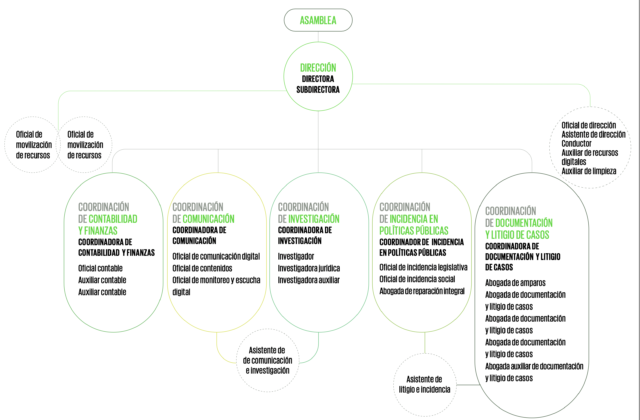Asamblea General
Está conformada por 11 especialistas en diferentes ramas, que contribuyen a la visión estratégica y gobernanza de GIRE. Su conocimiento de los diferentes temas y su convicción y compromiso con los derechos humanos de las mujeres dan perspectiva al trabajo de GIRE desde 2011.
Actualmente lo integran: Marta Lamas (presidenta), Gerardo Barroso, Roy Campos, Genaro Lozano, Francisca Pou, Karla Iberia Sánchez, Cecilia Suárez, Roberto Tapia, Gabriela Warkentin y José Woldenberg.

Marta Lamas, Fundadora y presidenta de la Asamblea de GIRE
Dirección Ejecutiva
Rebeca Ramos es abogada feminista por la Escuela Libre de Derecho y Maestra en Derechos Humanos por la Universidad Iberoamericana. Comenzó a trabajar en GIRE en enero de 2012 y fue coordinadora del área de Incidencia en Política Pública. Desde marzo de 2020 es la directora ejecutiva. Anteriormente, fue asesora parlamentaria y formó parte del grupo de trabajo para la reforma constitucional sobre derechos humanos. Rebeca también fue coordinadora general del Centro Jurídico para los Derechos Humanos y ha participado en diversas publicaciones. En mayo de 2024 fue reconocida por la revista TIME como una de las 100 personas más influyentes del mundo por su trabajo a favor de los derechos reproductivos. Cuando el patriarcado caiga, quiere abrir una librería y beber café.

Rebeca Ramos (Ella), Directora Ejecutiva
Subdirectora
Frania Colmenero es licenciada en Derecho por la Universidad Anáhuac (Xalapa) y maestra en Derecho con especialización en Derecho Público por el University College London (UCL). Antes de GIRE, trabajó durante 15 años en instituciones públicas en áreas jurídicas, de cooperación internacional y planeación estratégica. En los últimos años, desarrolló estrategias y criterios de planeación en instituciones de seguridad social, principalmente en temas relacionados con el derecho y la salud pública. También es docente a nivel licenciatura. Cuando caiga el patriarcado, Frania se aventurará por el mundo en un recorrido gastronómico.

Frania Colmenero (Ella), Subdirectora
Finanzas
La Coordinación de Finanzas es responsable del correcto ejercicio del presupuesto. Esto incluye el cumplimiento puntual con nuestras entidades proveedoras y colaboradoras, con donantes y con las leyes de Transparencia y Lavado de Dinero. Los estados de cuenta de GIRE son auditados por una de las empresas líderes en contabilidad a nivel global, Price Waterhouse Coopers, con resultados de cumplimiento total con los requisitos legales y fiscales que transparentan la operación de la organización.
Maricela Monroy es contadora pública por el Instituto Politécnico Nacional (IPN) y estudió la especialidad de Dirección, Liderazgo y Finanzas en IPADE Business School. Antes de GIRE, trabajó durante 20 años en diversas organizaciones de la sociedad civil en defensa de los derechos humanos y perspectiva de género como gerenta de Administración y Finanzas. Cuando el patriarcado caiga, pondrá un restaurante de comida típica mexicana, donde ella será la chef.

Maricela Monroy (Ella), Coordinadora de Finanzas
Comunicación
La Coordinación de Comunicación se encarga de posicionar los temas y el trabajo de GIRE en el debate público. Con un lenguaje sencillo y amigable, brinda información sobre los derechos reproductivos a audiencias diversas. Potencia las estrategias de incidencia y litigio, y favorece la comprensión de los temas. Trabaja los mensajes de forma constante para cambiar narrativas y es el enlace de la organización con el exterior a través de campañas y diferentes acciones de difusión.
La labor de esta coordinación ha logrado, en muchos casos, la empatía del público con mujeres cuya situación era desconocida. Esto las ayudó a alcanzar la justicia ante las violaciones de derechos humanos de que fueron víctimas.
Brenda Rodríguez tiene estudios doctorales en Ciencia Política y Sociología por la Universidad Nacional Autónoma de México (UNAM). Es licenciada en Relaciones Internacionales por la UNAM, maestra en Estudios de la Mujer por la Universidad Autónoma Metropolitana (UAM) y cuenta con Estudios Avanzados en Género por la Universidad Complutense de Madrid. Tiene amplia experiencia en la generación de contenidos, elaboración de campañas y estrategias digitales. Antes de GIRE, Brenda fue investigadora y analista en política y ha publicado varios ensayos sobre ciudadanía y género. Cuando el patriarcado caiga, será cantante de rock y coach de wellness feminista para mujeres de más de 40 años.

Brenda Rodríguez (Ella), Coordinadora de Comunicación
Documentación y Litigio de casos
La Coordinación de Documentación y Litigio de Casos apoya a las mujeres para que puedan ejercer sus derechos reproductivos y las acompaña en su búsqueda de justicia cuando sus derechos han sido violados por el Estado.
Las personas que trabajan en esta coordinación viajan constantemente a diferentes comunidades, lo que les permite generar una relación de confianza con las personas a quienes brindan acompañamiento.
Este acompañamiento puede ser en forma de apoyo psicológico, médico y legal, según lo que cada mujer o familia requiera.
Incidencia en Política Pública
La Coordinación de Incidencia en Política Pública monitorea de forma permanente la normativa y políticas públicas relacionadas con derechos reproductivos en México, y diseña estrategias para impulsar cambios acordes con los estándares más altos en derechos humanos y evitar retrocesos en los mismos, tanto a nivel federal como local. Entre sus estrategias se encuentran reuniones con legisladores, la emisión de recomendaciones a diversas autoridades y la elaboración de informes alternativos para los diferentes comités internacionales de derechos humanos.
Esta coordinación también da seguimiento a los procesos de reparación integral para las víctimas de violaciones a derechos reproductivos, incluyendo medidas de no repetición.
Francisco Cué es licenciado en Ciencia Política y Administración Pública por la Universidad Nacional Autónoma de México, y tiene varios diplomados en cabildeo, análisis y producción jurídica y normativa. Se unió a GIRE en 2017. Francisco también ha sido coordinador de monitoreo legislativo e inteligencia política en diferentes consultorías dedicadas a los asuntos públicos y asesoría legislativa, especialmente en materia de salud pública. Cuando caiga el patriarcado, Francisco se dedicará de lleno a la carpintería.

Francisco Cué (Él), Coordinador de Incidencia en Política Pública
Investigación
La Coordinación de Investigación sistematiza información pública, ya sea de encuestas y estadísticas oficiales, o que se obtenga a través de solicitudes de acceso a la información pública. Luego la confronta con la información que se obtiene a través de los casos, para elaborar documentos que den cuenta del estado de los derechos reproductivos en México.
Desde esta área se realizan informes generales y específicos de los temas prioritarios de GIRE. Los informes se distribuyen entre responsables de tomar decisiones, quienes lideran la opinión, medios de comunicación, profesionales de la academia y especialistas, con la intención de generar diálogo, difundir y visibilizar las deudas del Estado mexicano con las mujeres. Cada informe contiene las recomendaciones que se envían a las diferentes autoridades desde GIRE.
Verónica Esparza es abogada por la Escuela Libre de Derecho de Puebla, maestra en derecho de amparo y constitucional por la Universidad Iberoamericana, Golfo Centro, y doctora en derechos humanos por la Universidad Nacional de Educación a Distancia de España. Comenzó a trabajar en GIRE en julio de 2018 como investigadora jurídica. Desde diciembre de 2021 es coordinadora del área de investigación. Anteriormente, fue investigadora independiente y algunos de sus productos de investigación se han publicado en revistas especializadas. Trabajó también en la Comisión Nacional de los Derechos Humanos, donde ocupó diversos cargos. Cuando el patriarcado caiga, quiere reformar casas deterioradas para que queden increíbles.

Verónica Esparza (Ella), Coordinadora de Investigación
Organigrama



